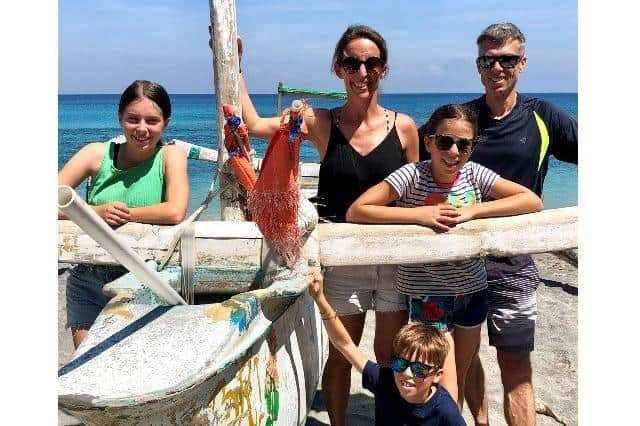Leamington woman shares experience of contracting mosquito bite disease abroad
and live on Freeview channel 276
A Leamington woman has shared her experience of contracting the disease dengue while travelling in Indonesia.
Sarah Loveday, 45, met her husband while travelling around Indonesia.
Advertisement
Hide AdAdvertisement
Hide AdThey decided to celebrate their 20-year anniversary by heading back to where their relationship started with their three children, for a dream five-week family backpacking trip.


Two-and-a-half weeks into their trip, Sarah’s eldest daughter, aged 12, became unwell and started to complain of a fever and aches.
As an experienced traveller who’d spent time in Indonesia before, Sarah thought it may be because of something she had eaten.
The following day, Sarah also fell ill.
She said: “I had horrible aches behind my eyes, they were so sensitive to the light, I didn’t want to open them.
Advertisement
Hide AdAdvertisement
Hide Ad“Given both of us weren’t getting any better, we decided to go to a local clinic to see if there was anything that could be done. We were tested for malaria, but it was negative.
"I had heard of dengue before and so asked if we could be tested for that too however, they unfortunately said they couldn’t. Instead, they recommended we continue to rest and stock up on electrolyte drinks to help with our dehydration.”
As the days passed, Sarah’s daughter began to improve, “we didn’t want this to railroad our trip and considering my daughter was feeling better, I assumed I would soon follow suit and so we decided to carry on as planned.”
Dengue is the fastest-spreading mosquito-borne disease and was recognised by the World Health Organization (WHO) in 2019 as one of the top ten threats to global health.
Advertisement
Hide AdAdvertisement
Hide AdIt is passed to people through the bites of infected mosquitoes most commonly found in tropical and sub-tropical climates – many of which are popular holiday destinations.
A few days later, Sarah’s symptoms continued to worsen.
What started as a fever and aches had developed into severe joint aches, vomiting and dehydration, leaving Sarah feeling weak and unable to keep food down.
Sarah said: “I hadn’t eaten in days, had developed a rash and knew I needed to see a doctor.
"With us being so remote and not able to access the care we needed we flew to a nearby town that had a hospital.
Advertisement
Hide AdAdvertisement
Hide Ad"When we arrived, the doctors quickly confirmed it was dengue after running some tests, and said I’d need to stay in for a few days for IV fluids and monitoring.”
Nearly five million UK and Irish travellers visit dengue endemic regions every year and the disease is second only to malaria as the most diagnosed cause of fever among travellers returning to Europe.
It is usually a mild infection, but in rare cases it could lead to hospitalisation.
Around 20 per cent of holidaymakers who contract dengue are hospitalised in the country they are visiting as a result.
Advertisement
Hide AdAdvertisement
Hide AdAfter three days, Sarah felt a lot better and was discharged.
With ten days left of their trip, they decided to continue.
She said: “We’d always planned to end the trip in the Gili Isles, so we decided to do just that.
"I didn’t have the stamina to carry on the journey exactly the way we had planned, but it was nice to relax on the beach and it meant our trip wasn’t entirely ruined.”
Looking back, Sarah added: “Thankfully we all have brilliant memories from the trip that will last a lifetime - while we don’t like to dwell too much on the negatives, the experience has made us all realise that awareness of this unpleasant disease is key.
Advertisement
Hide AdAdvertisement
Hide Ad“Whenever we hear of other people going travelling, we always tell them about mosquitoes and dengue.
"I never want anyone to feel the fear or be put off travelling, as there is a wonderful world out there to discover, but equally knowing the risks and the necessary precautions can mean you can fully enjoy your trip with no interruptions.”
To help UK and Irish travellers understand more about dengue this summer, Takeda UK Ltd. and Takeda Products Ireland Ltd. has launched Explore Uninterrupted, a new campaign which is intended to raise awareness of dengue among UK and Irish travellers and help educate them on how to avoid mosquito bites.
The Explore Uninterrupted website https://exploreuninterrupted.co.uk/ allows UK & Irish travellers to identify if they are visiting a dengue endemic region via an interactive map and provide information on where to go to seek further travel health advice.
For more information about Dengue including how to prevent catching it visit the NHS website at https://www.nhs.uk/conditions/dengue/